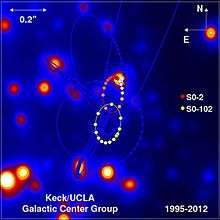S0–102
| Observation data Epoch Equinox | |
|---|---|
| Constellation | Sagittarius |
| Right ascension | |
| Declination | |
| Characteristics | |
| Astrometry | |
| Distance | 25900 ± 1400 ly (7940 ± 420 pc) |
| Orbit | |
| Companion | Sagittarius A* |
| Period (P) | 11.5 ± 0.3 yr |
| Eccentricity (e) | 0.68 ± 0.02 |
| Inclination (i) | 151 ± 3° |
| Longitude of the node (Ω) | 175 ± 5° |
| Periastron epoch (T) | 2009.5 ± 0.3 |
| Argument of periastron (ω) (secondary) | 185 ± 9° |
| Other designations | |
[GKM98] S0–102. | |
| Database references | |
S0–102 is a star that is located very close to the centre of the Milky Way, near the radio source Sagittarius A*, orbiting it with an orbital period of 11.5 years. As of 2012 it is the star with the shortest known period orbiting the black hole at the centre of the Milky Way. This now beats the record set by S0–2 of 16 years. The star was identified by a University of California, Los Angeles team headed by Andrea M. Ghez.[1] At its periapsis, its speed exceeds 1% of the speed of light.[2] At this point it is 260 astronomical units (36 light hours, 38.9 billion km) from the centre. The black hole radius is less than one thousandth of that size (11 million km). It passed that point in 2009 and will be there again in 2020.[3]
Its position in the sky has been monitored from 2000 to 2012 using the W. M. Keck telescope. One complete orbit has been observed. From Earth's current perspective, it travels in a clockwise direction. Having observed two stars orbiting through complete periods around the centre, the gravitational potential of SgrA* can be established. Possibly there is a great deal of dark matter around the orbits of these stars. Also general relativistic effects due to gravitational redshift should become observable.[4]

References
- ↑ Stuart Wolpert (4 October 2012). "UCLA astronomers discover star racing around black hole at center of our galaxy".
- ↑ "S0-102". 20 October 2012.
- ↑ Emspak, Jesse (4 October 2012). "Speedy Star Swoops In Perilously Close to Milky Way's Giant Black Hole". space.com. Retrieved 5 July 2016.
- ↑ Meyer, L.; Ghez, A. M.; Schödel, R.; Yelda, S.; Boehle, A.; Lu, J. R.; Do, T.; Morris, M. R.; Becklin, E. E.; Matthews, K. (2012). "The Shortest-Known-Period Star Orbiting Our Galaxy's Supermassive Black Hole". Science. 338 (6103): 84–87. arXiv:1210.1294
 . Bibcode:2012Sci...338...84M. doi:10.1126/science.1225506. PMID 23042888.
. Bibcode:2012Sci...338...84M. doi:10.1126/science.1225506. PMID 23042888.
External links
- University of California (4 October 2012). "Astronomers discover star racing around black hole at Milky Way center". Retrieved 6 October 2012.
- A. M. Ghez (4 October 2012). "Supplementary Materials for The Shortest Known Period Star Orbiting our Galaxy's Supermassive Black Hole" (PDF). Includes position measurements and images.